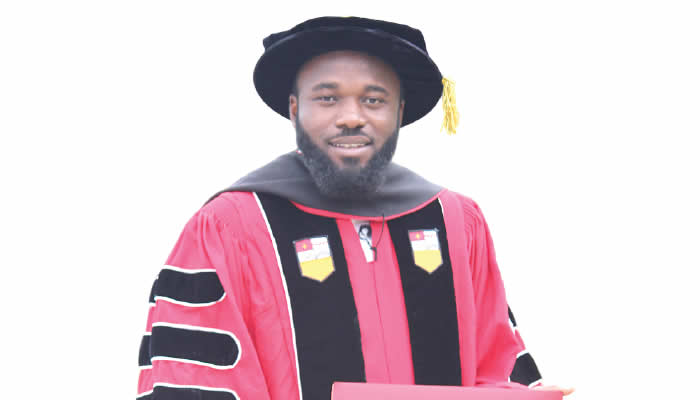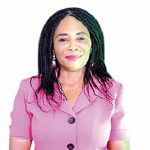Research Associate at the Los Alamos National Laboratory, United States, Dr Lucky Yerimah, shares with VICTOR AYENI how harsh experiences as a child growing up in Nigeria affected him academically and how he rose to become a first-class UNIBEN graduate, among other issues
Was there a memorable, heartwarming experience from your childhood?
I grew up in Agenebode, a small town in the northern part of Edo State. We share our border with Kogi State. My dad was first of all married to his first wife and they had a couple of children before he got married to my mother who was the second wife.
He rented an apartment for his first wife outside. So, my mum and dad were living together. So, we didn’t feel we were in a polygamous family. In my immediate family, there are five (four boys and one girl) and I am the second son.
I can remember the very first day I started walking. According to my mum, when I was less than a year old, I was very sick and they took me to the hospital several times, and I even had to undergo a hernia surgery. It was very tough on my parents and after all of the several sicknesses that I went through, I couldn’t walk on time like every other child out there.
My mother was worried. She went to prayer houses and brought some anointing oil and other stuff to rub on my legs. None of them worked. She consulted native doctors and one of them gave her some cowries and instructed her to tie them to my legs and once they fell off, I would start working. She followed their instruction, but I still wasn’t walking even after the cowries fell off my legs.
At some point, my mum gave up, thinking I might not be able to walk because I was physically weak due to all the sicknesses I had. But my dad always encouraged my mum that I was going to walk. I vividly remember the first day I started to walk. I just stood up and when my dad saw me, he couldn’t believe it. My mum heard his voice from inside and ran outside and everybody was happy that finally, I could walk. I think I was already two years old at the time.
At what point did things begin to go downhill?
That was on March 29, 2006, when there was a solar eclipse. It was that day my parents divorced. Before that day, there had been some quarrels between my parents. My mother accused my father of dating a secondary school student, and in return, he accused her of trying to harm him.
My mum had to move out of the house and our younger sister (the last born who was four years old) had to go with my mum. I started experiencing some real difficulty, especially because as soon as my mum moved out of the house, my dad brought home the lady he was dating and within a few weeks, the lady moved her things permanently to the house.
This affected all of us, especially my younger sister because at that point, she was always ill, and my mum would say she didn’t have any money to take her to the hospital and he (my father) would, in turn, ask her to go meet my mum. I got to a point I dreaded staying at home. The only place I found happiness and meaning in my life then was when I was in school because when I’m in school, I’m around my friends.
Whenever it was a Friday, I would be very sad because Friday means that I would be away from the happy environment for the next two days and have to bear all the issues and drama at home. At that point, I was 13 years old and in secondary school, but I wasn’t particularly the best student in my class. I knew deep down inside of me that I could do more, that I was much more than what my results were showing in school.
Sometimes my dad would tell me, ‘Why are your results showing that you are 13th in class? Why can’t you be first in class? Are those coming first better than you?’
What were some of the harsh experiences you had after your parents’ divorce?
Our home became hell for all of us after their divorce. At some point, my dad would call me to ask me if I was sure that my mum did not possess some kind of diabolical power. At one point, he accused me of being a spy for my mother, telling him all that was happening in the house.
As soon as my mum left home and my dad brought in his girlfriend whom he later married, I was no longer eating at home. Most times, taking breakfast meant that I had to endure humiliation or I would go very late to school. Usually, in my school, we didn’t close until 3pm; so, I wouldn’t eat anything for the day until maybe 4pm or 5pm when I came back from school.
That affected me both emotionally and physically because that was how I developed peptic ulcer which later defined most of my adulthood, even till now. During those periods, it was very tough being able to focus or do anything meaningful at school but the only thing that gave me hope at that moment was that I felt very happy that I was in school because that was the only place where I found meaning in my life.
Another challenge that I had was that I couldn’t do any studying at home or do my homework. It was very hard because anything at home, we had to do domestic work given to us by our stepmother.
How did you become academically sound?
While I was in senior secondary school, I became a friend to a corps member living very close to our home back then. He drew me out of the house to come and stay with him in his room. During that period, he started teaching Chemistry and Mathematics and I found a special attraction to these two subjects through him.
There was another corps member in our church who announced that he was going to organise a free lesson for secondary school students and I was among the first people to sign up for those lessons. I took these lessons seriously because they helped me escape from the suffering in the house. The first defining moment for me was when I was in SS1 and I took some SS3 WAEC questions and I found out I could find solutions to them. I was impressed with myself.
Towards the end of my SS1, I studied a popular Mathematics textbook and finished all the exercises in it. That boosted my self-confidence. That was the moment I knew that there was nothing impossible for me to achieve.
Did this progress cause your father to change positively towards you?
No. When I wanted to sit for my first UTME, he told me to take it later. It felt like he was deliberately delaying my progress. I had no other option. So, I began working in a computer centre in our town. During my free time, I was studying for my UTME.
The money I made from working was what I used to register for the examination by myself. I no longer cared what my father said about it. My UTME score was 236 and I was disappointed because I expected a better grade based on how I correctly answered the subjects. Thankfully, the score was enough for me to get admitted into the University of Benin to study Chemical Engineering.
What was the major event that altered your academic trajectory?
In December 2012, during my first year at UNIBEN, I came home and was in my dad’s shop when I saw my friend running home to take a scholarship exam. He told me I could as well write the scholarship exam even though I didn’t apply for it. I rushed home, grabbed my documents, and wrote the examination and I had the highest score and won that scholarship.
The following year was a difficult one because I was not successful in all the national scholarships like Addax, Agip, Mobil, NLNG, and Chevron which I wrote.
I felt it was because I was competing with the best people from the best backgrounds and secondary schools. But in 2014, I applied and finally won the Agbami (MTN Foundation), Total, and another regional scholarship in Edo State. These were the defining moments for me.
Did you come across these scholarships by chance?
No. After the first scholarship that I got by chance in 2012, I was always actively searching online for scholarships and I even had to sign up on some websites that sent me notifications whenever there was a scholarship window.
Which of these scholarships that you won was the most challenging?
It was the MTN Science and Technology scholarship examination. They gave us 200 questions to answer in two hours. Some of the questions were very difficult and others were moderately difficult, but I was getting most of the answers. After about 130 minutes, I still had 100 questions left to be answered; I felt as if I was torturing my brain at that point because my brain could no longer function to read or understand the questions. I was almost giving up.
Then I asked myself, ‘Is it easy for an organisation to be paying you N200,000 a year, do you think it would be easy?’ That was how I resolved to tighten my belt. I felt a rush of energy flow into me and I started rushing to answer the remaining 100 questions. When I had one minute left, I had like 20 questions still unanswered. So, I entered an ‘A’ for the remaining 20 questions and submitted it like that. A few months later, I got selected for that scholarship.
All the scholarships covered my living expenses throughout my university days. So, I didn’t have to depend on anyone for financial help. I began sending money to my mum for her to take care of my younger sister who was also a student.
You proceeded to a doctorate in the US directly from your undergraduate in UNIBEN. Tell us how this happened.
After graduating with a first class in UNIBEN, I initially didn’t plan to pursue any scholarship for graduate school. But a friend introduced me to some Nairaland platforms where people were actively discussing and pursuing graduate programmes in the US.
In my search, I found out that almost all the universities have scholarships for PhD students, but very few have scholarships for Master’s students. It was a setback for me because I didn’t even think I was qualified to do a PhD directly from my undergraduate studies.
I then realised that for all of these universities, even though they appreciate people who already have master’s degrees, the minimum requirement was just a bachelor’s degree. So, I knew I was qualified.
Eventually, I found an organisation named Education USA which guides students who want to study in the US. I later realised that they had a special scholarship programme for people who graduated with a first class but you will have to write an exam and do an interview. I passed both processes and they paid all my expenses, including my application fee.
What were some of the things you had to adjust to in the US?
When I attended class during my first week in the US, I felt like an impostor, like I didn’t belong there, because when the professor was teaching, I didn’t even understand what they were teaching. It felt like there were a lot of things I didn’t know.
They give homework every week and when I was given my first homework, I had a very poor score. So, I felt like I wasn’t good enough. But after a while, I now realised that I wasn’t the only person struggling.
Even those who did their undergraduate studies in the US were also struggling. So, we formed a group and started learning together and began to get good grades. I eventually won awards in my third year.
I realised that the US curriculum was the same with that of Nigeria, but what was missing in our curriculum at home was the practical implications and usefulness of the theories that we were taught. We just memorised the theories, wrote the exam and got the grades but we didn’t know their usefulness.
There are many youths in marginalised communities and from backgrounds similar to yours. Is there an initiative that can help and support them?
I have one initiative that I initially wanted to start last year but due to some challenges, I had to put it on hold. I intend to reach out to secondary schools in my hometown, but my mother doesn’t want me to travel home due to the security issues in the area which has caused many youths to flee the community.
But this year, I plan to work with some secondary school teachers in my hometown and organise online seminars to show them that schooling in a home town does not stop you from achieving great things.





GIPHY App Key not set. Please check settings